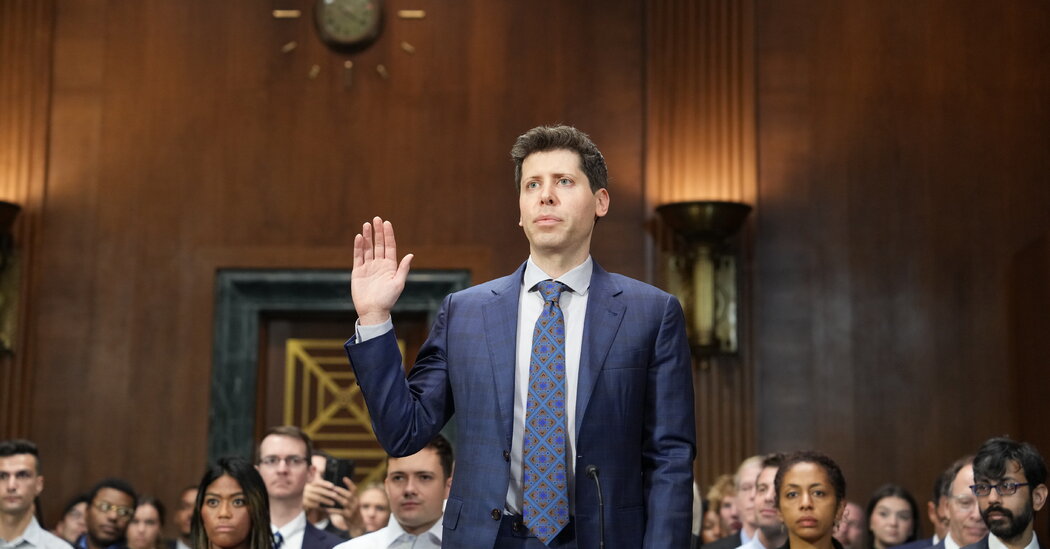The tone of congressional hearings involving tech industry executives in recent years can best be described as antagonistic. Mark Zuckerberg, Jeff Bezos and other tech luminaries have all been dressed down on Capitol Hill by lawmakers upset with their companies.
But on Tuesday, Sam Altman, the chief executive of the San Francisco start-up OpenAI, testified before members of a Senate subcommittee hearing and largely agreed with them on the need to regulate the increasingly powerful A.I. technology being created inside his company and others like Google and Microsoft.
The boyish-looking Mr. Altman traded in his usual pullover sweater and jeans for a blue suit and tie as he offered a loose framework to manage what happens next with the fast-developing systems that some believe could fundamentally change the economy.
In his first testimony before Congress, Mr. Altman implored lawmakers to regulate artificial intelligence as members of the committee displayed an understanding of the technology, underscoring the deep unease felt by technologists and government over A.I.’s potential harms.
“I think if this technology goes wrong, it can go quite wrong. And we want to be vocal about that,” he said. “We want to work with the government to prevent that from happening.”
Mr. Altman made his public debut on Capitol Hill as interest in A.I. has exploded. Tech giants have poured billions of dollars and effort into what they say is a transformative technology, even amid rising concerns about A.I.’s role in spreading misinformation, killing jobs and one day matching human intelligence.
That has thrust the technology into the spotlight in Washington. President Biden this month said at a meeting with a group of chief executives of A.I. companies that “what you’re doing has enormous potential and enormous danger.” Top leaders in Congress have also promised A.I. regulations.
The appearance of Mr. Altman, a 38-year-old Stanford University dropout and tech entrepreneur, was his christening as the leading figure in A.I. He was joined at the hearing by an executive from IBM and a well-known professor and frequent critic of A.I. technology.
Mr. Altman said his company’s technology may destroy some jobs but also create new ones, and that it will be important for “government to figure out how we want to mitigate that.” He proposed the creation of an agency that issues licenses for the creation of large-scale A.I. models, safety regulations and tests that A.I. models must pass before being released to the public.
“We believe that the benefits of the tools we have deployed so far vastly outweigh the risks, but ensuring their safety is vital to our work,” Mr. Altman said.
But after nearly three hours of questioning in Tuesday’s hearing, it was unclear how lawmakers would respond to the call to regulate A.I. The track record of Congress on tech regulations is grim. Dozens of privacy, speech, and safety bills have failed because of partisan bickering and fierce opposition by tech giants.
Lawmakers brought up the idea of an independent agency to oversee A.I., rules that force companies to disclose how their models work and the data sets they use, and antitrust rules to prevent companies like Microsoft and Google from monopolizing the nascent industry.
Lawmakers were generally friendly toward Mr. Altman, thanking him for his private meetings with them and for agreeing to appear in the hearing. They approached him as an educator.
Senator Richard Blumenthal, Democrat of Connecticut and chairman of the Senate panel, said the hearing was the first in series to learn more about the potential benefits and harms of A.I. to eventually “write the rules” for it. He also acknowledged Congress’s failure to keep up with the introduction of new technologies in the past.
"Our goal is to demystify and hold accountable those new technologies to avoid some of the mistakes of the past,” Mr. Blumenthal said. “Congress failed to meet the moment on social media.”
This is a developing story. Check back for updates.
Source: Read Full Article
